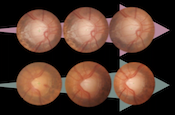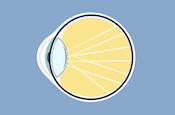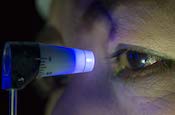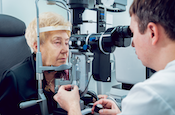Keyword search: 176 records shown
| Course categorySort by Course category Ascending | Course nameSort by Course name Ascending | Course summarySort by Course summary Ascending | New CourseSort by New Course Descending Descending |
|---|---|---|---|
| CPD courses | Binocular Vision: Beyond the prism (November 2021 Webinar) (Updated 2025) | 
CPD Points: CPD Type: Non-interactive Closing Date: 31 December 2026 Domains: Communication, Clinical practice
This recorded lecture by Dr Aleksandra Mankowska explores four case studies involving patients with binocular vision problems. Each case includes a discussion of presenting symptoms, appropriate clinical assessments and management strategies, offering optometrists practical insights into the diagnosis and treatment of common binocular vision issues. Topics: Paediatric, Multiple sclerosis, Convergence insufficiency, Esophoria, Exophoria, Prism, Fusional reserves, Stereopsis, Cycloplegic, Tropia, Microtropia, Convergence weakness, Refraction, Amblyopia, Nystagmus. | No |
| CPD courses | Sound Optometry: Episode 52 - Brain Tumours, Part 2: Red flags for referral |
CPD Points: CPD Type: Non-interactive Closing Date: 31 March 2026 Domains: Communication, Clinical Practice
Building on Episode 51’s discussion of brain tumours, this episode features optometrist Lorcan Butler from the Brain Tumour Charity, who explains how he helps eyecare practitioners recognise suspicious neuro-ophthalmological signs and symptoms. Topics: Brain tumours, Neuro-ophthalmology, Idiopathic intracranial hypertension, Papilloedema, Optic disc drusen, Optic disc, Communication, Referrals, Breaking bad news. | No |
| CPD courses | Sound Optometry: Episode 53 - Periorbital skin disorders: What’s an optometrist to do? |
CPD Points: CPD Type: Non-interactive Closing Date: 31 March 2026 Domains: Clinical Practice, Specialty CPD (IP)
Around half of the UK population experiences a skin condition each year, and optometrists often encounter ocular or periocular effects of conditions such as eczema and rosacea. In this episode of Sound Optometry, dermatologist Dr Bryan Murphy discusses common skin conditions seen in community practice and advises when optometrists can manage them or should refer. Topics: Atopy, Eczema, Dermatitis, Psoriasis, Allergies, Benign lesions, Malignant lesions, Auto-immune disease, Prescribing, Topical steroids. | No |
| CPD courses | Cataract: Part 3 - Post-treatment (Non-interactive) (Updated 2026) |
CPD Ref: C-114656 CPD Points: CPD Type: Non-interactive Closing Date: 31 December 2026 Domains: Clinical practice, Communication, Specialty CPD (IP)
The third and final part of the cataract series addresses postoperative assessment, potential complications and their management and postoperative care pathways, including referrals. Topics: Cataract, Cataract series, Surgery, Postoperative assessment, Complications, Pathways, CMO, Uveitis, Retinal detachment, IOP, PCO, Referral, Emergency, IOL, Dislocation. | No |
| CPD courses | Glaucoma - The optic disc challenge (June 2023 Webinar) (Updated 2026) |  CPD Ref: C-114598 CPD Points: CPD Type: Non-interactive Closing Date: 31 December 2026 Domains: Clinical practice
In this recorded lecture, led by Mr Paddy Gunn, optometrists are given an opportunity to assess and reflect on their optic disc interpretation skills for a range of patient cases. The cases review the key elements to look out for when examining the optic disc, other information to consider and how to use technology, such as OCT, to effectively support the management of glaucoma suspects. Topics: Visual fields, Tonometry, Glaucoma, OCT, IOP, Normal tension, Ocular hypertension, Optic pit, Optic nerve, RNFL. | No |
| CPD courses | Contact Lenses: Fitting Children, Part 1 - Considerations for the optometrist, child and family (Non-interactive) (Updated 2026) |
CPD Ref: C-114592 CPD Points: CPD Type: Non-interactive Closing Date: 31 December 2026 Domains: Clinical practice, Communication
In the first part of this two-part course, three children and their parents share their experiences with starting contact lens wear and managing it in daily life. We also hear from two optometrists about the process of fitting contact lenses in children and the benefits they can provide. Topics: Prevalence, Benefits and perceived barriers to contact lens wear in children, Quality of life, Microbial keratitis, Soft contact lenses, Rigid gas permeable lenses, Orthokeratology, Anisometropia, Amblyopia, Nystagmus, Myopia management, Seasonal allergic conjunctivitis, Contact lens handling. | No |
| CPD courses | The Young Eye: Assessment of Vision, Part 1 - Birth to three years (Non-interactive) (Updated 2026) |
CPD Ref: C-114841 CPD Points: CPD Type: Non-interactive Closing Date: 31 December 2026 Domains: Clinical practice, Communication
This is the first part of a two-part course focused on assessing vision from birth to 18 years. Part one highlights the importance of taking a thorough history and understanding symptoms when assessing children’s vision and examines how to choose the most appropriate techniques for assessing infants and children up to the age of three years. It also discusses the significance of using age-appropriate communication styles. Topics: History and symptoms, Preferential looking, Cover test, Stereopsis, Emmetropisation, Mohindra retinoscopy, Cycloplegic refraction, Binocular vision, Communication skills, Ocular health assessment, 20D lens, Binocular vision, Crowded picture acuity tests, Young eye series. | No |
| CPD courses | The Young Eye: Assessment of Vision, Part 2 - Pre-school to secondary school-age children (Non-interactive) (Updated 2026) |
CPD Ref: C-114842 CPD Points: CPD Type: Non-interactive Closing Date: 31 December 2026 Domains: Clinical practice, Professionalism
This course is the second of two parts focused on assessing vision from birth to 18 years. Part two examines how to choose the most appropriate tests, equipment and techniques for vision in pre-school and school-age children. It also highlights the considerations around safeguarding, confidentiality and consent. Topics: Communication, Dynamic retinoscopy, Slit-lamp examination, Colour vision testing, Unexpected results, Gillick competence, Confidentiality, Consent, Safeguarding, Crowded letter acuity test, Prescribing, Young eye series. | No |
| Administration only | TEST DO NOT USE - XXXX: Part 1 - Definitions and classification (Non-interactive) (Early 2026) |
CPD Ref: C-xxxxxx CPD Points: CPD Type: Non-interactive Closing Date: 31 March 2026 Domains: Clinical practice, Communication
The first part of the XXXX series provides an updated overview of XXXX definitions and prevalence, and explores the classification of its various types. It also covers the signs, symptoms and risk factors to support more accurate differential diagnosis and timely referral. Topics: XXXX, NICE, SIGN, POAG, COAG, CAG, Congenital, Ocular hypertension, Prevalence, Secondary, Paediatric, PAC, PACG, AACG. | No |
| Administration only | TEST DO NOT USE - XXXX: Part 2 - Pathophysiology and risk factors (Non-interactive) (Early 2026) |
CPD Ref: C-xxxxxx CPD Points: CPD Type: Non-interactive Closing Date: 31 March 2026 Domains: Clinical practice, Communication
The second part of the XXXX series reviews normal eye anatomy and the pathophysiological changes involved in the development of XXXX. It also explores current theories on the causes of XXXX and examines the risk factors associated with its different types. Topics: XXXX, CCT, IOP, POAG, CCAG, Ocular hypertension, PAC, PACG, Risk calculator, Optic nerve, Optic disc, Anatomy. | No |
| Administration only | TEST DO NOT USE - XXXX: Part 3 - Assessment (Anterior segment and anterior chamber angle) (Non-interactive) (Early 2026) |
CPD Ref: C-xxxxxx CPD Points: CPD Type: Non-interactive Closing Date: 31 March 2026 Domains: Clinical practice, Professionalism
The third part of the XXXX series focuses on evaluating the anterior segment and angle to recognise key signs of XXXX and identify major risk factors. Topics: XXXX, NICE, SIGN, POAG, COAG, CAG, Van Herick, Smith’s method, Gonioscopy, OCT, Referral, PDS, PXF. | No |
| Administration only | TEST DO NOT USE - XXXX: Part 4 - Assessment of the intraocular pressure (IOP) (Non-interactive) (Early 2026) |
CPD Ref: C-xxxxxx CPD Points: CPD Type: Non-interactive Closing Date: 31 March 2026 Domains: Clinical practice, Professionalism
The fourth part of the XXXX series focuses on measuring intraocular pressure (IOP) with both contact and non-contact tonometers, reviewing normal results and outlining referral criteria. Topics: XXXX, NICE, SIGN, POAG, COAG, CAG, Intraocular pressure, Referral , IOP, tonometer, GAT, Perkins, Ocular hypertension, CCT, Corneal thickness. | No |
| Administration only | TEST DO NOT USE - XXXX: Part 5 - Assessment of the optic disc (Non-interactive) (Early 2026) |
CPD Ref: C-xxxxxx CPD Points: CPD Type: Non-interactive Closing Date: 31 March 2026 Domains: Clinical practice, Professionalism
The fifth part of the XXXX series explores the assessment and measurement of the optic disc, highlighting key signs of XXXX. It explains how to use indirect ophthalmoscopy and interpret OCT disc images to support referral decisions and the management of XXXX suspects. Topics: XXXX, NICE, SIGN, POAG, COAG, Optic disc, Assessment, Slit lamp, Indirect ophthalmoscopy, OCT, Management, Referral, Volk. | No |
| Administration only | TEST DO NOT USE - XXXX: Part 6 - Visual fields (Non-interactive) (Early 2026) |
CPD Ref: C-xxxxxx CPD Points: CPD Type: Non-interactive Closing Date: 31 March 2026 Domains: Clinical practice, Professionalism
The sixth part of the XXXX series focuses on accurately evaluating the visual field to identify important signs of XXXX. Topics: XXXX, NICE, SIGN, Management, Referral, Threshold, SITA, ZATA, Static, Kinetic, FDT. | No |
| Administration only | TEST DO NOT USE - XXXX: Part 7 - Management, referral and care pathways (Non-interactive) (Early 2026) |
CPD Ref: C-xxxxxx CPD Points: CPD Type: Non-interactive Closing Date: 31 March 2026 Domains: Clinical practice, Professionalism
The seventh part of the XXXX series explores national and local refinement and referral pathways, and discusses how to make appropriate clinical decisions in managing a XXXX suspect by considering all investigative findings. Topics: XXXX, NICE, SIGN, POAG, COAG, Ocular hypertension, Management, Referral, Repeat measures, Pathway, IOP, Visual field. | No |
| Administration only | TEST DO NOT USE - XXXX: Part 8 - Treatment (Non-interactive) (Early 2026) |
CPD Ref: C-xxxxxx CPD Points: CPD Type: Non-interactive Closing Date: 31 March 2026 Domains: Clinical practice, Specialty CPD (IP)
The eighth and final part of the XXXX series explores current and future treatments of XXXX. Topics: XXXX, NICE, SIGN, POAG, COAG, CAG, Ocular hypertension, Laser treatment, Surgical treatment, Pharmacological treatments, Management, Referral, MIGS, SLT. | No |











